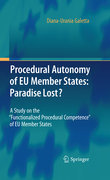
Procedural autonomy of EU member states : paradise lost?: a study on the 'Functionalized Procedural Competence' of EU member states
Galetta, Diana-Urania
Is the procedural autonomy of EU Member State a myth or a reality? What should this concept be taken to mean? Starting from the analysis of requirements and principles regulating, generally speaking, the relationships between Member States’ and EU law, this book provides a definition of procedural autonomy able to account for the concept’s inherent limits. Out of an analysis of the morerelevant EU jurisprudence, the author identifies the rationale underlying theinterventions of the ECJ on issues of procedural autonomy and the common logic that emerges from it; and reveals how, in an unchanged context of ‘procedural autonomy’ of the Member States, national procedural law becomes more and more ‘functionalized’ to the requirements of effectiveness of substantive EU law.As such, we should speak of a ‘functionalized procedural competence’ rather than of procedural autonomy. But this is by no means a case of “Paradise Lost.”The book includes a foreword by Prof. Jürgen Schwarze, one of the founding fathers of European Administrative Law." The book sheds clear light on the procedural autonomy of the EU Member States Deep analysis of the term 'procedural autonomy' and the legal problems connected with it INDICE: Introductory Notes, Terminological Issues and Demarcation of the Scope of the Study.- The Procedural Autonomy of the Member States >From the Viewpoint of the Principles and Criteria Regulating the Relations Between National Law and EU Law.- The Jurisprudence of the European Court of Justice on the Procedural Autonomy of Member States: Analysis of the Fundamental Judgements.- The Procedural Autonomy of the Member States: Judges and Legislators.- Conclusions.
- ISBN: 978-3-642-12546-1
- Editorial: Springer
- Encuadernacion: Cartoné
- Páginas: 200
- Fecha Publicación: 21/07/2010
- Nº Volúmenes: 1
- Idioma: Inglés
